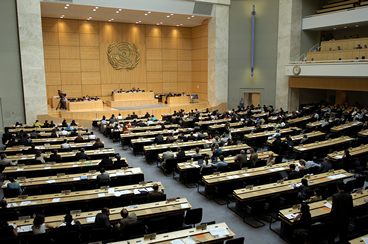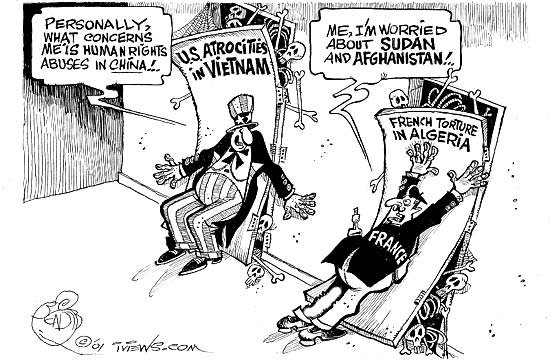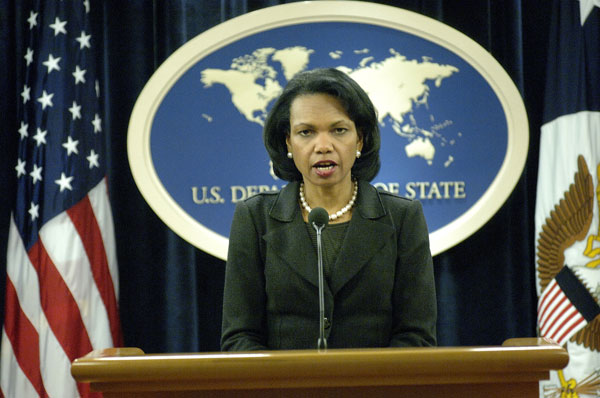 By Otto Spijkers
By Otto Spijkers
"What government is today’s champion of human rights?" This is the question raised, and answered, by Kenneth Roth, the executive director of Human Rights Watch, in his lecture at the Carnegie Council . Roth basically summarized the Human Rights Watch World Report of 2007. He said that the US can no longer credibly advocate rights that it flouts, and that the world must look for a new human rights champion.
The argument that the US attitude has drastically changed since 2001, or perhaps even before, is also made by Philippe Sands in his book Lawless World. In this book, Sands argues that the post-war world order, first described by Roosevelt and Churchill in the Atlantic Charter of 1941, an order based on three principles (no more war between nations, respect for human dignity, economic and social cooperation), is not as passionately supported by the US as before.  One can question whether the US (and Europe) actually defended these principles so passionately in the past, but it seems clear that Sands and Roth are right in saying that a change for the worse occurred recently.
One can question whether the US (and Europe) actually defended these principles so passionately in the past, but it seems clear that Sands and Roth are right in saying that a change for the worse occurred recently.
Of course, says Roth, the US does not flout all human rights. It does not engage in genocide, and thus it can put pressure on the Sudanese government to stop the genocide in Darfur. And it can tell Russia to respect the freedom of the media and the right of all people to meaningful participation in governance, since there’s a free media and a democracy in the US. But the US cannot blame anyone for committing torture, or for detention without trial, because the US commits torture and detains people without a trial.
The United States continues to point at its own and other states’ human rights violations. It recently published a report with a whole range of accusations. When she presented the report, Condoleezza Rice told the press that

We do not issue these reports because we think ourselves perfect, but rather because we know ourselves to be deeply imperfect, like all human beings and the endeavors that they make. Our democratic system of governance is accountable, but it is not infallible. We are nonetheless guided by enduring ideals: the inalienable rights of humankind and the principles of democracy toward which all people and all governments must continue striving. And that includes us here in America.
However, apart from publishing reports, the US does less and less to promote human rights. For example, it refuses to campaign for a seat in the Human Rights Council (the first picture is of a Council Meeting) because the Council is not credible (this is a view shared by many, including Ken Roth himself). Such a boycott is a novelty in US politics: it was always present in the old (and equally uncredible) Human Rights Commission (it never left between 1947 and 2001).
According to Roth, the European Union should take over and become the new human rights champion (emphasis on ‘should’, because it has not done so yet). Roth: "With Washington’s voice diminished, the European Union today should be the strongest and most effective defender of human rights. It is founded on human rights principles and aspires to greatness in global affairs." The European Constitution (rejected in a referendum by the Dutch and French people) describes the values and goals of the European Union. Its values are:
The Union is founded on the values of respect for human dignity, freedom, democracy, equality, the rule of law and respect for human rights, including the rights of persons belonging to minorities. These values are common to the Member States in a society in which pluralism, non-discrimination, tolerance, justice, solidarity and equality between women and men prevail.
In its relations with the wider world, the Union shall uphold and promote its values and interests. It shall contribute to peace, security, the sustainable development of the Earth, solidarity and mutual respect among peoples, free and fair trade, eradication of poverty and the protection of human rights, in particular the rights of the child, as well as to the strict observance and the development of international law, including respect for the principles of the United Nations Charter.
Roth’s hope is that the European Union will do exactly that: promote human rights in its relations with the wider world, including the United States of America.
